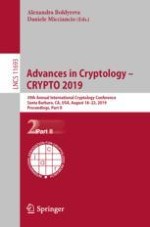2019 | OriginalPaper | Buchkapitel
Security of the Fiat-Shamir Transformation in the Quantum Random-Oracle Model
verfasst von : Jelle Don, Serge Fehr, Christian Majenz, Christian Schaffner
Erschienen in: Advances in Cryptology – CRYPTO 2019
Aktivieren Sie unsere intelligente Suche, um passende Fachinhalte oder Patente zu finden.
Wählen Sie Textabschnitte aus um mit Künstlicher Intelligenz passenden Patente zu finden. powered by
Markieren Sie Textabschnitte, um KI-gestützt weitere passende Inhalte zu finden. powered by


